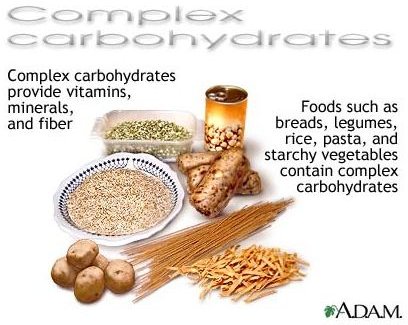What Are Complex Carbs: Learn About these Valuable Carbohydrates
Carbohydrates
What are complex carbs? First let us briefly discuss what carbs are. They are the ideal fuel for the body to function optimally, especially the brain and central nervous system. There are two types of carbohydrates: simple (concentrated sugars like table sugar and naturally occurring sugars like those in fruits) and complex (starch and fiber). All of these are made completely or partly of glucose (sugar) and all but fiber can be converted to glucose in the body. Glucose is what gives our cells, tissues and organs the energy they need. Extra glucose is converted into glycogen, which is then stored primarily in the liver to be used when needed.
What Are Complex Carbs?
The chemical structure of complex carbohydrates is made up of three or more sugar molecules, whereas simple carbs consist of one or two. Despite its more complex structure, not all foods containing starch and/or fiber are digested and absorbed more slowly than foods containing naturally occurring simple sugars. To prevent a rapid rise in blood glucose levels, it is more important to go by the glycemic index (GI) than the type of carbohydrate. Foods with a low GI are absorbed more slowly than those with a high GI. For instance, white potatoes have a GI between 80 and 89 percent, and fresh cherries have a GI between 20 and 29 percent. It is also important to note that refined foods consisting of complex carbs such as white bread and white rice are not as beneficial as natural forms like whole grains.
What Foods Contain Complex Carbs?
The following are some foods that contain complex carbs (grams of carbs / grams of fiber / grams of sugars / GI percent):
Whole wheat bread: 1 slice = 24 / 3 / 2 / 60 and 69
Bran flakes: 3/4 cup = 24 / 5 / 6 / 70 and 79
Brown rice: 1 cup = 45 / 4 / 1 / 50 and 59
Whole wheat spaghetti: 1 cup = 37 / 6 / 1 / 30 and 39
White potato: 1 large = 63 / 7 / 4 / 80 and 89
Sweet potato: 1 large = 37 / 6 / 12 / 50 and 59
Corn: 1 cup = 41 / 5 / 5 / 50 and 59
Pinto beans: 1 cup = 45 / 15 / 1 / 40 and 49
Soybeans: 1 cup = 17 / 10 / 5 / 10 and 19
Lentils: 1 cup = 40 / 16 / 4 / 20 and 29
Green peas: 1 cup = 21 / 7 / 8 / 40 and 49
Peanuts: 1 cup = 22 / 14 / 6 / 10 and 19
Final Note
Carbohydrates are essential for a healthy diet. Medline Plus recommends that most people should get between 40 and 60 percent of total calories from carbohydrates. The majority should be from complex carbs and natural sugars. Refined sugars, like those in candies and sodas, lack vitamins and minerals.
References
Medline Plus: Carbohydrates - https://www.nlm.nih.gov/medlineplus/ency/article/002469.htm
Ann Louise Gittleman, M.S., C.N.S., Guide To The 40/30/30 Phenomenon (2002)
Self Nutrition Data - https://nutritiondata.self.com/
Photo Credit
Image courtesy of the National Library of Medicine (NLM)
